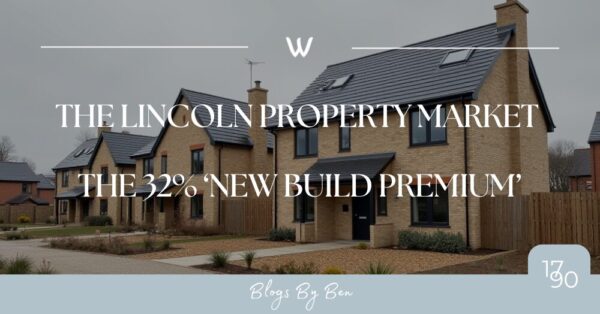A Comprehensive Guide for Lincoln Homeowners
In the ever-changing world of Lincoln property, the terms ‘buyers’ market’ and ‘sellers’ market’ are phrases bandied about.
These property market conditions can significantly impact your ability to buy or sell a Lincoln property, regardless of which side of the fence you find yourself on.
As a Lincoln estate agent, I will provide you with a detailed analysis of the Lincoln property market to find out if we are in a buyers’ or sellers’ market and offer valuable tips to navigate through them successfully.
Additionally, I will shed light on a lesser-known market condition called a ‘balanced market’. So, let’s delve into the nuances of these markets and equip you with the knowledge to make informed decisions on buying and selling in Lincoln.
What is a Lincoln Buyers’ Market?
A ‘buyers’ market’ occurs when the number of Lincoln homes available for sale exceeds the number of potential buyers. In this scenario, buyers hold the advantage, as they have more choices and can take their time to make decisions. They may even negotiate with sellers to secure more favourable prices. This is an ideal market for Lincoln buyers as attractive deals are plentiful, while sellers face the challenge of standing out in a sea of properties for sale.
What is a Lincoln Sellers’ Market?
Conversely, a sellers’ market arises when there is a higher demand for homes than available inventory. This creates a power shift in favour of sellers, who can benefit from increased competition among buyers. In a seller’s market, Lincoln properties tend to sell quickly and sellers often receive multiple offers, driving up property prices. This market can be challenging for Lincoln buyers, as they may face bidding wars and have limited negotiating power.
Introducing a Balanced Market.
Apart from the buyers’ and sellers’ markets, a balanced property market exists where the number of people looking to sell property matches the number of potential buyers. In a balanced market, equilibrium is achieved, leading to stable prices and a reasonable timeframe for property sales. This market condition offers a fair playing field for both buyers and sellers, creating a more harmonious real estate environment.
Understanding the Dynamics: Supply and Demand of Lincoln Property.
At the core of these property market conditions lies the principle of supply and demand.
Lincoln home buyers have the upper hand when the supply of Lincoln homes surpasses the demand. Conversely, when demand outpaces supply, Lincoln house sellers hold the advantage. Recognising which property market you are in is crucial for making informed decisions, regardless of whether you are a buyer or a seller.
What Kind of Property Market is Lincoln in?
The best way anyone can judge the market is to analyse the percentage of properties marked as “Sold STC” (Sold Subject to Contract) and “Under Offer” in relation to the total stock of properties on the market.
E.g. if there are 500 properties on the market (both available and sold stc/under offer) and 200 are sold stc/under offer … 200 as a percentage of 500 is 40%.
Everyone can do this by searching the property portals (e.g. Rightmove, Zoopla and OnTheMarket) by searching for Lincoln and calculating it by asking for the results with sold stc/under offer and without sold stc/under offer.
The designated property market states are as follows:
- 0% to 20%: Extreme Buyers’ Market
- 21% to 29%: Buyers’ Market
- 30% to 40%: Balanced Market
- 41% to 49%: Sellers’ Market
- 50% to 59%: Hot Sellers’ Market
- 60%+: Extreme Sellers’ Market
This methodology is widely used by many professional property traders, corporate asset managers and developer part exchange providers to quickly assess the temperature of any local market. It offers a reliable and efficient measurement of market heat, enabling informed individuals to select the right strategies and stay ahead of the market to achieve superior results.
The statistics have been sourced from website ‘The Advisory’, which have calculated the market state stats for many years. I wanted to share them back to the summer of 2018, so you can see for yourself.
What are the Statistic s for Lincoln for the Last 5 Years?
| Jun-18 | Jun-19 | Jun-20 | Jun-21 | Jun-22 | Dec-22 | Mar-23 | May-23 | Jun-23 | |
| LN1 | 36% | 37% | 25% | 58% | 53% | 39% | 31% | 28% | 30% |
| LN2 | 43% | 34% | 32% | 57% | 60% | 35% | 34% | 36% | 36% |
| LN3 | 34% | 37% | 35% | 62% | 61% | 37% | 33% | 33% | 33% |
| LN4 | 36% | 34% | 23% | 60% | 57% | 35% | 31% | 28% | 28% |
| LN5 | 39% | 37% | 32% | 59% | 60% | 43% | 35% | 32% | 36% |
| LN6 | 47% | 41% | 37% | 69% | 67% | 43% | 36% | 36% | 38% |
You can quite clearly see Lincoln went into a hot/extreme sellers’ market during 2021 and 2022 yet has been returned to a level similar to pre pandemic.

Now of course this could all change, so let me explain both extremes for either market.
Tips for Lincoln Home Sellers in a Buyers’ Market
Selling a Lincoln property in a buyers’ market can be daunting, but you can improve your chances of success with the right approach. Here are some valuable tips for Lincoln home sellers:
- Be realistic with your asking price: If the Lincoln property market becomes a buyers’ market, home sellers will need to understand the challenging market conditions and set a competitive price from the beginning. Overpricing will deter potential Lincoln buyers from even viewing and lead to your home being on the market for months. People will start to think there will be something wrong with your home and dismiss it even more.
- Present your Lincoln home at its best: In a competitive buyers’ market, making your property stand out is vital. Consider staging your home and completing any necessary repairs to make it more appealing to home buyers.
- Maximise your exposure: Effective marketing is crucial, particularly in a buyers’ market. Collaborate closely with a reputable local Lincoln agent with extensive area knowledge and a strong marketing team to ensure maximum visibility for your property. Gone are the days of just putting the property on Rightmove and hoping.
- Be prepared to negotiate on more than the pound notes: Price is not the only factor in negotiations. Buyers may also be open to discussing terms and conditions like what you are leaving regarding fixtures and fittings, so be flexible and willing to find common ground.
Tips for Buyers in a Lincoln Seller’s Market
If you find yourself navigating a sellers’ market as a Lincoln buyer, these tips will help you improve your chances of securing the right property:
- Define your necessities: Clearly understand your property needs and prioritise them. Be prepared to compromise on certain aspects to increase your chances of finding a suitable property.
- Be friendly: Build a positive rapport and relationship with the home sellers on the viewing. This can really work in your favour. First impressions can make a difference.
- Act quickly: In a seller’s market, hesitation can lead to missed opportunities. If you come across a Lincoln property that meets your criteria, schedule a viewing promptly and be prepared to make an offer if it resonates with you.
- Make fair offers: While everyone wants a great deal, offering a reasonable price shows respect to sellers and increases the likelihood of your offer being considered. Silly low offers are often dismissed in competitive markets and can sometimes offend.
- Practice patience: Although speed is essential, exercising patience is equally vital. Rushing into a decision can result in regret. The right property will come along, so balancing acting swiftly and making informed choices is critical.
Understanding the dynamics of buyers’ and sellers’ markets is essential for both buyers and sellers in the Lincoln property market.
By grasping the nuances of each market condition and applying the appropriate strategies, you can maximise your chances of achieving your Lincoln property goals. Whether you find yourself in a buyer’s market, seller’s market, or a balanced market, adapting your approach and working closely with an experienced local agent will significantly enhance your chances of success in the ever-changing world of real estate.
But let me leave you with this one last thought. Regardless of whether it’s a buyer’s or seller’s market, it’s important to recognise the interconnected nature of these market conditions.
A significant statistic to consider is that 81% of sellers are also buyers.
This means that as you gain an advantage as a seller in a hot market, you may face challenges when transitioning to the buyer’s side.
Conversely, in a buyers’ market where you have the upper hand as a buyer, you might encounter difficulties when selling your own property.
It’s crucial to understand this dynamic and plan accordingly, as the dynamics of the Lincoln property market are often a delicate balance between gaining and losing, and this holds true for both buyers and sellers.
These are my thoughts, do share yours in the comments or by reply.


